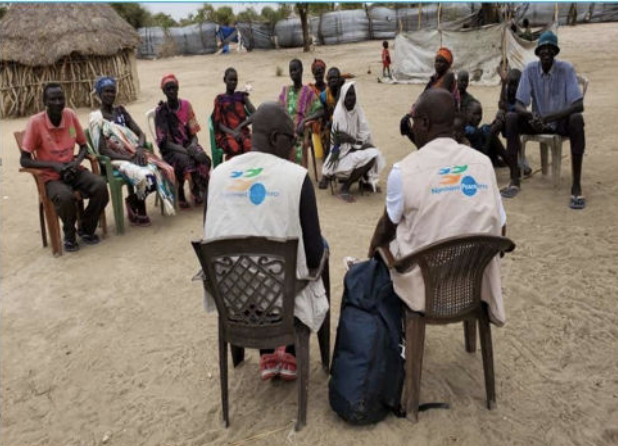“In the wet season, we are in the darkness": Protection in Flood-Affected Areas

Rapid Assessment
When heavy floods struck South Sudan in October 2019, Duk Payuel County, Jonglei State sustained critical damage and its residents were among the most affected in the country. In December 2019, Nonviolent Peaceforce dispatched its Mobile Protection Response Team to Duk Payuel town to assess the scale and scope of the damage and identify vulnerable persons to inform rapid emergency response to affected communities. During the eight-day mission, NP conducted observation patrols and met with women and men individually and in groups as well as local authorities, traditional leaders, and humanitarian organizations to listen to their concerns and needs.
Duk Payuel County, home to nearly 2,000 households, is largely populated by Dinka and Nuer who are heavily reliant on farming, hunting and cattle-keeping to survive. The flooding, however, killed a significant number of cattle while cattle that did survived were seriously ill. While on patrol, NP observed that flood waters were still high, particularly endangering children and persons with disabilities, dead animals were lying in the open, and crops, shelters and infrastructure were heavily damaged or completely destroyed by the water.
“In the wet season, we are in the darkness,” commented one of the Chiefs on the flooding.
When speaking to the community members, NP also learned that the dire situation caused by the flooding was further compounded by high levels of sexual and gender-based violence (SGBV), inter-communal violence, and frequent violent cattle-raids carried out by the neighboring Murle tribe. Fearing being attacked and abducted while collecting firewood or picking wild berries, women and girls stopped going far into the bush and as a result, were struggling to secure enough food for their families. Although the threat from the Murle had subsided as the water made the area largely inaccessibly by road, the potential for an attack would return as soon as the floods receded. Upon returning to Juba, the team immediately shared its findings with the Protection Cluster and relevant stakeholders through a flash report followed by a rapid assessment report, highlighting protection and non-protection concerns of communities in Duk Payuel.
Rapid Response
NP returned to Duk Payuel for another eight-day mission to conduct a series of trainings and awareness sessions on SGBV, child protection, conflict mediation, and early warning and early response (EWER). At the time of the response mission, the flood waters had almost entirely receded across Duk Payuel County and the risk of Murle attacks had returned with several incidents occurring while MPRT was in the area. With this in mind, NP’s response was manifold.
NP established referral pathways for SGBV survivors in the area.
This was followed by a series of workshops with community members on SGBV prevention and response that aimed to enhance community capacity to prevent SGBV, eliminate stigmatization, and encourage reporting and access to post-incident services. The response to the workshops was positive. One man stated that in previous cases of a woman being raped, the survivor would be alienated from the community:
“We used to dislike her. We used to not talk to her. Even she might kill herself. But now we know to help her.”
Additionally, NP advocated with the John Doe Foundation for the provision of PEP kits to the Duk Payuel hospital and further training in response to SGBV cases to improve quality of post-incident service.
NP trained humanitarian actors, chiefs, and religious leaders in protection mainstreaming
As a result of this training, the participants understood the concept and importance of protection mainstreaming in the provision of humanitarian services, and recognized shortcomings in the General Food Distribution implementation such as unfair treatment of community members by distribution staff and impeded access to humanitarian aid. While NP advocated for the humanitarian partner to look into community complaints, it also encouraged the chiefs to voice their complaints to a humanitarian agency when Protection Mainstreaming principles were not being applied.
“We never knew that we as religious leaders who are part of the larger community leaders can play a role in protection mainstreaming with service delivering,” said one of the participants.
NP raised awareness on the vulnerability and protection of children
NP discussed the needs of unaccompanied, impaired, or disabled children who are often left behind in times of emergency, giving an example of children with visual impairment who were relocated to Potcap due to safety concerns as they would not have been able to flee in case of an emergency. NP also raised awareness on harmful traditional practices such a child, early, and forced marriages and importance of education. Such outreach was well-received by the community members, with one of the fathers remarking:
“Education is better than 50-100 cows. The education lasts a long time, the cows die - just like now.”
NP facilitated a conflict mediation workshop for Chiefs
NP framed the discussion within the community request for NP mediation with the Murle. The workshop aimed to enhance the capacity of local leaders in resolving and settling disputes within and between the communities, utilizing key principles such as impartiality, confidentiality, and neutrality.
NP contacted veterans to care for sick cattle
Lastly, while in Duk Payuel, NP observed that large numbers of cattle had been affected by an unidentified disease and were dying in mass. NP promptly contacted Veterinaries Sans Frontiers Germany who sent their team from Poktap and addressed the issue.
NP’s deployment to Duk Payuel County enabled humanitarian partners to provide timely lifesaving assistance for a community in dire need of assistance and address the most pressing protection concerns. Furthermore, NP’s follow up visit, and subsequent community training, strengthened the capacity of community members to better protect themselves, withstand shocks, and resist harmful cultural norms.
